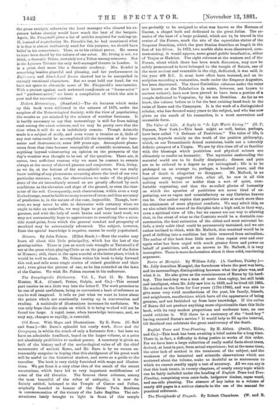The Value of Life. A Reply to "Is Life Worth
Liuing ?" (G. P. Putnam, New York.)—This book might as well, better, perhaps, have been called "A Defence of Positivism." The value of life, it appears, depends mainly on the truth of the positive philosophy, which, as our Transatlantic friend maintains, holds out a tolerably definite prospect of a Utopia. We are by this time all of us familiar with the blessings which positivism and physical science are ultimately to confer on humanity. The mysteries enshrouding the material world are to be finally dissipated ; disease and pain are to be relieved to a degree as yet unimagined ; life is to be prolonged on an average to, perhaps, a hundred years, and the
fear of death is altogether to disappear. Mr. Mallock, in an ingenious essay, suggested that, after all, he saw in all this nothing much better or nobler than a sort of quiet, com- fortable vegetating, and that the so-called glories of humanity on which the apostles of positivism are never tired of ex- patiating, are as vague and unsatisfactory as any Christian heaven can be. Our author replies that positivism aims at much more than the attainment of mere physical comforts. We may admit this, as we also admit that some of its disciples take a high and, in their way, even a spiritual view of life; but we cannot see our way to allowing that, in the event of what to the Comtists would be a desirable con- summation, the final extinction of the oldest and most universal be- liefs, a truly noble ideal could be permanently sustained, and we are rather inclined to think, with Mr. Matlock, that mankind would be in peril of drifting into a condition but little removed from animalism. The author of this book does little more than repeat over and over again what has been urged with much greater force and power on behalf of positivism, and, as an answer to Mr. 3iallook, it is very incomplete. There is more declamation about it than solid, convincing argument.


































 Previous page
Previous page